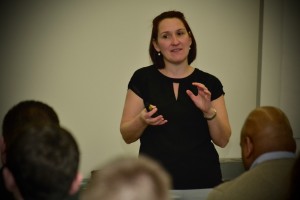
Brad Dove expects to run his own business some day. But he wants success to be defined by something greater than a line of numbers on a ledger.
It has to include making a positive difference in the lives of others, people he may never meet.
“There is a different mindset than punching numbers, there is a different kind of profit,’’ said Dove, a third-year student in the Bachelor of Business Administration program at Wilfrid Laurier University. “People care about the planet and think about social change.”
That kind of thinking brought Dove, several of his Laurier classmates and two dozen other people out to a workshop Feb. 11 to talk about turning the passion behind social entrepreneurship into sustainable progress.
Although it comes in different models, social entrepreneurship essentially builds a business around something (could be a product, could be a service) that delivers a social or environmental benefit.
Founders of social enterprises tend to be young. Laurier, the University of Waterloo and Conestoga College offer courses or programs on the subject. The GreenHouse program at the St. Paul’s University College incubates social enterprises. Across the road at Conrad Grebel University College, the MSCU (Mennonite Savings and Credit Union) Centre for Peace Advancement houses the Frank and Helen Epp Peace Incubator to drive social innovation.
Tools for change
Passion and idealism, however, only go so far. Like any other business, a social enterprise starts with the good bones of common sense. It identifies a need, tests assumptions rigorously and, as the business moves ahead, checks in on itself to see whether new data changes the mandate.
“You have to ask the right questions: What do you want to change, and who benefits from the change?” said Tanya Darisi who led the Discovering Your Social Impact workshop at the Communitech Hub. “What is the social value of your enterprise?
Capacity Canada partnered with ASCEnt, Communitech’s Accelerating Social Cause Entrepreneurs unit, to host the event. An expert in organizational evaluation and director of The O’Halloran Group, Darisi recommended social entrepreneurs draw up a social business model canvas that includes objectives, revenues, costs and impact.
Content for the canvas, she said, needs to be developed through questions asked, and assumptions mapped out, in theory of change and logic models. This also sets the stage for information that gets analyzed and refined into a key report for a social enterprise — the social return on investment.
As vital as it is, the effort of collecting data and evaluating data shouldn’t stifle a social enterprise’s fire-in-the-belly for a cause.
“These tools and processes help you along your journey,” she said. “They are not the journey itself.”
Dove, the Laurier student, said the workshop reinforced what his business courses say about the importance of structure and discipline in validating ideas.
“Every social entrepreneur has passion to make change,” he said. “That passion can sometimes lead you all over the place. You get so caught up in the emotion of it when what you need to do is step back, focus on your goals; how to accomplish them and how to engage people.”

